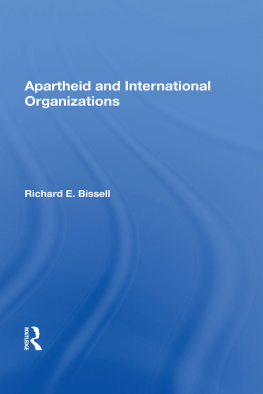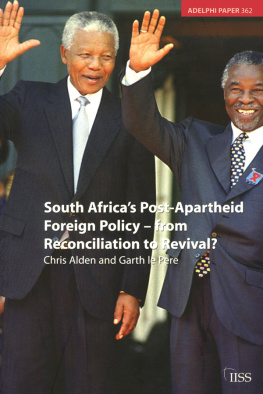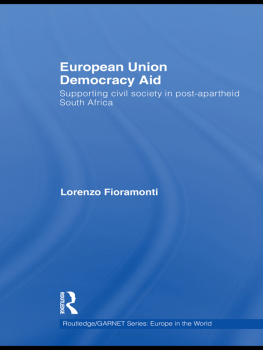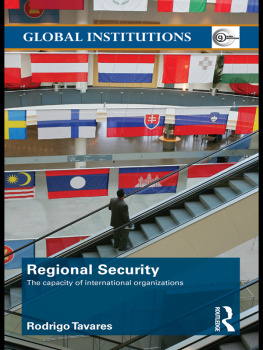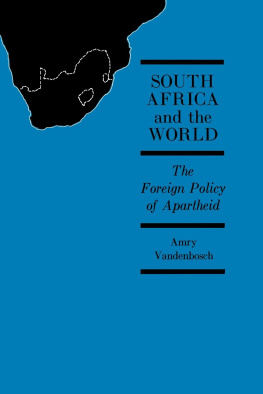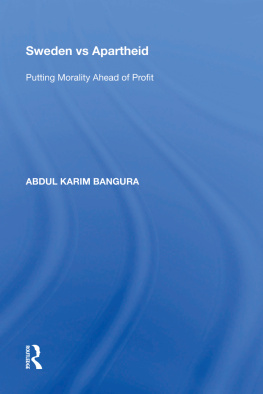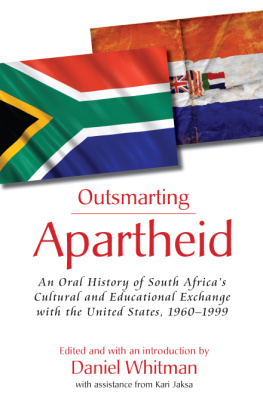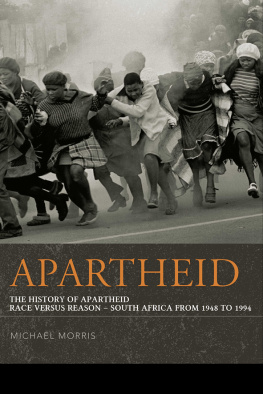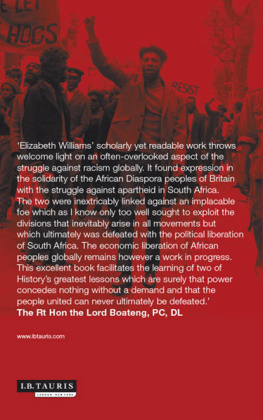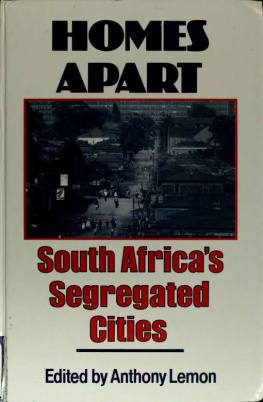First published 1977 by Westview Press
Published 2018 by Routledge
52 Vanderbilt Avenue, New York, NY 10017
2 Park Square, Milton Park, Abingdon, Oxon OX14 4RN
Routledge is an imprint of the Taylor & Francis Group, an informa business
Copyright 1977 by Taylor & Francis
All rights reserved. No part of this book may be reprinted or reproduced or utilised in any form or by any electronic, mechanical, or other means, now known or hereafter invented, including photocopying and recording, or in any information storage or retrieval system, without permission in writing from the publishers.
Notice:
Product or corporate names may be trademarks or registered trademarks, and are used only for identification and explanation without intent to infringe.
Library of Congress Cataloging in Publication Data
Bissell, R E
Apartheid and international organizations.
(Westview special studies on Africa)
Includes bibliographical references.
1. South AfricaForeign relations. 2. South Africa
Race question. 3. International agencies. I. Title.
JX1584.S7B6 327.68 76-57761
ISBN 0-89158-229-0
ISBN 13: 978-0-367-01780-4 (hbk)
Thirty years have passed since the founding of the United Nations (UN) in San Francisco, where, before the First Session had been adjourned, the General Assembly passed a resolution about South African racial policies. The output since 1945 of resolutions, debates, and publications, and the time expended on the subject of those policies known collectively as apartheid, has been enormous. Indeed, there seems to be an overall trend toward a progressively greater preoccupation with apartheid on the part of UN organs and related specialized agencies.
South Africa has certainly not been the only international pariah in this age of contending ideologies, but it has clearly been more isolated diplomatically, over a longer period of time, than any other state challenging the international majority. Major and minor examples of diplomatic isolation can be found in all parts of the world: Spain, Israel, Dominican Republic, Cuba, Yugoslavia, Greece, China, Portugal, and others. All have been subjected to social sanctions of varying intensity since 1945, and indeed, could profitably be compared with South Africa. None, however, has experienced isolation in universal and regional organizations in a comparably escalating fashion.
The widest possible significance of the apartheid dispute, therefore, must be found in South Africas role as a nation-state, and its interface with international organizations. That interface involves the actions of a nation-state in the policymaking of an organization, as well as the implementation of resolutions. Likewise, the organizations need to be seen as targets of diplomatic efforts, by both South Africa and the other African states, and also as actors on the international stage attempting to influence South Africa. When one begins to explore the apartheid dispute fully, particularly over a long time, other states take on important roles, especially the United States and certain Western European states. At all times, however, the focus remains on South Africa and its interactions with the UN and the specialized agencies.
The unique qualities of the South African society and economy present equally formidable tasks of analysis. What, after all, causes the South African government to persist in returning to international organizations where the majority has denounced the very foundations of South African rule? One could possibly suggest a fundamental internationalism, possibly sheer masochism. Such a strong desire to participate in the international community seems strangely contradictory, in any case, given the record of South African intransigence over the recommendations of international organizations. The South African side of the interface between national policies and international action is thus of prime importance.
Aside from analyzing the course of pressures on South Africa from international organizations, this study includes an attempt to determine the consequences of this dispute for South Africa, for international organizations, and, briefly, for the world at large. Apartheid policies have been affected, even though the exact causal relationship between such changes and international action is hard to determine. For organizations, the lessons are more diffuse, related to the effectiveness of sanctions, the interests of organizations independently of particular blocs of members, and the roles of secretariats. For the world at large, the apartheid dispute has been a model for the recent efforts to apply sanctions against Israel.
Briefly, the study is constructed along the following lines. into an international conflict by 1959. The appearance of strong, persistent hostility to apartheid by the newly independent African states is the theme of chapter two. During that phase, roughly 196063, South Africa had little response to offer to attacks in international organizations. By the period 196364, covered in chapter three, the establishment of the Organization of African Unity conveyed remarkable continuity and momentum to the anti-apartheid movement. South Africa retreated from one organization after another.
The diplomatic counterattack by the South Africans during 196469 was thus a natural sequel to the devastating losses of international presence during the preceding period. While an objective measure of South Africas strength during the late 1960s is somewhat difficult to obtain, it is clear that the momentum of the African drive had been checked. In the following years, 197076, as indicated in chapter five, the storm of protest against apartheid did not abate, but the South Africans learned to lean into the wind, and a diplomatic stalemate ensued. The conclusion, then, indicates how present patterns of interaction might be projected into the future, based on the course of the conflict to date.

